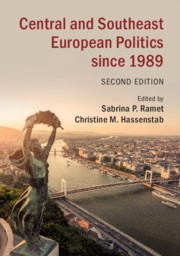Book contents
- Central and Southeast European Politics since 1989
- Central and Southeast European Politics since 1989
- Copyright page
- Dedication
- Contents
- Figures and Maps
- Tables
- Contributors
- Preface
- Glossary
- Guide to the Pronunciation of Central and Southeast European Words
- Additional material
- Part One Introduction
- Part Two Issues
- Part Three Central Europe
- Part Four Yugoslav Successor States
- Part Five Southeastern Europe
- Part Six Present and Future Challenges
- 19 Regional Security and Regional Relations
- 20 The European Union and Democratization in Central and Southeastern Europe since 1989
- 21 Conclusion – Adapting to the Twenty-First Century: Lessons, Progress, and Regression
- Index
- References
20 - The European Union and Democratization in Central and Southeastern Europe since 1989
from Part Six - Present and Future Challenges
Published online by Cambridge University Press: 16 September 2019
- Central and Southeast European Politics since 1989
- Central and Southeast European Politics since 1989
- Copyright page
- Dedication
- Contents
- Figures and Maps
- Tables
- Contributors
- Preface
- Glossary
- Guide to the Pronunciation of Central and Southeast European Words
- Additional material
- Part One Introduction
- Part Two Issues
- Part Three Central Europe
- Part Four Yugoslav Successor States
- Part Five Southeastern Europe
- Part Six Present and Future Challenges
- 19 Regional Security and Regional Relations
- 20 The European Union and Democratization in Central and Southeastern Europe since 1989
- 21 Conclusion – Adapting to the Twenty-First Century: Lessons, Progress, and Regression
- Index
- References
Summary
A central tool of the European Union (EU) to promote the democratization of post-communist Europe is its accession conditionality: the conditions it attaches to the offer of membership. Yet the EU’s influence on democratization varies across countries, and over time between the periods before and after accession. A key factor limiting the EU’s impact are the domestic costs of complying with the EU’s conditionality: the more governments rely on illiberal and undemocratic means to maintain power, the less influence the EU has. Moreover, even if the domestic adjustment costs are not prohibitively high, for EU conditionality to bring about, or lock in democratic change, the positive and negative incentives relating to the benefits of EU membership have to be credible. The limited credibility of the EU’s incentives, both of the sanctions against backsliding in new members and of the reward of accession for current candidate countries in Southeastern Europe, is a key explanation for the setback in the EU’s democratizing role during this decade.
Keywords
- Type
- Chapter
- Information
- Central and Southeast European Politics since 1989 , pp. 539 - 562Publisher: Cambridge University PressPrint publication year: 2019
References
Further reading
- 5
- Cited by

